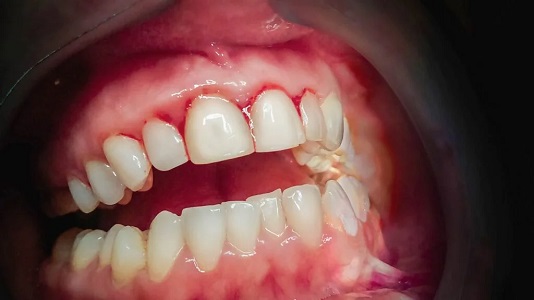

By Titilayo Kupoliyi
Gingivitis, Akokoro in Yoruba is a disease of the gum that causes inflammation of the gingiva which is the part of the gum around the base of the tooth.
If it is not treated promptly, it can lead to periodontitis, a more serious gum disease which can lead to the loss of a tooth.
The most common cause of gingivitis is poor oral hygiene which can lead to the formation of plaque (a sticky film inhabited by bacteria which arises from the interaction with residues of food in the mouth).
Good oral hygiene (regular brushing, good health practices, regular dental examination) is the remedy to the formation of plaques.
Without this, plaques develop into tartars which make them (plaques) more difficult to clean and they may cause the gingiva to get inflamed (gingivitis)
From this level, they may develop into dental caries (tooth decay) which can advance into periodontitis.
Surely, there is a need to prevent tooth decay. While toothpaste comes in handy in this regard, but then chewing sticks can also provide the necessary help.
A chewing stick is a traditional brush created from a slender twig (usually about 1 cm or less in diameter) or from slices of more or less the same sizes split from bigger stems of plants that are used as chewing sticks.
The common names include cattle stick (English), Ikpafum, Ndiyan, Nyayanga (Ibibio), Abekpok ibuhu (Eket), Agba, Angalagala (Igbo)Egbo, Oshunshun (Yoruba).
The frontline chewing sticks are sold in the market stacked as bundles of about 6 to 10 sticks each about 25 cm in length. A chewing stick may have the bark intact as in Massularia acuminata which is called Pako Ijebu in Yoruba; the top is worked with the teeth into a brush which is used to clean the teeth.
The chewing stick is convenient for a radial motion along the rows of our teeth just as it is able to brush each tooth in a vertical or downward direction.
Brushing with the stick is effective in terms of the application of the optimal force, determined by reflex, to achieve effective cleaning without damaging the root. For people who use the chewing stick sparingly, some pain in the teeth may be experienced after the brushing exercise.
This pain goes after the first experience; it only serves to strengthen the roots of our teeth.
No one will advocate that we should go back to the chewing stick as a sole solution for our oral health but it is a past that we must keep alive because it is beneficial to do so.
They were exclusively used for cleaning teeth in the olden days but, with the advent of toothpastes, they could either be used before the paste as a finisher for oral cleaning.
Chewing sticks are mandatory in the mornings but they could be used at any time that oral cleaning is desired.
The sticks are prepared by washing to free them from soil particles and other debris; they are then shaped properly by cleaning off rootlets, and prominent outgrowths, complete removal of the barks in some cases as in Garcinia kola (orogbo in Yoruba) and slicing of the wood into manageable sizes for use followed by packaging for sale.
The chewing sticks showcase different kinds of attributes based on taste as demonstrated by Massularia (acceptable bitterness from the bark), Xanthoxylum zanthoxyloides (orin ata; Yoruba: root has a peppery taste), Vernonia amygdalina (wood, bitter taste turning sweet later) and T. glaucescens; T. laxiflora (root, a yellowish discolouration of the mouth and lips).
Nigerian researchers have demonstrated that three local chewing sticks performed better than fluoride-based and conventional kinds of toothpaste in preventing tooth decay.
According the Nigerian Tribune, the study, published in the British Journal of Pharmaceutical Research was entitled “A Study of the Anticaries Activity of Three Common Chewing Sticks and Two Brands of Toothpaste in South West Nigeria”.
It included Odeleye Olubola Florence; Okunye Olufemi Lionel; Kesi Christopher; and Abatan Temitope Olubunmi, all from the Faculty of Pharmacy, Olabisi Onabanjo University, Ago-Iwoye, Ogun State,
The researchers evaluated three common chewing sticks – Fagara zanthoxyloides, Vernonia amygdalina and Massularia accuminata- and two brands of toothpaste in southwest Nigeria for the ability to control caries-causing bacteria.
Zanthoxylum zanthoxyloides (Fagara zanthoxyloides) is called orin ata in Yoruba. Veronica amygdaline commonly called bitter leaf. Commonly called Chewing stick, Massularia acuminata is called pako-ijebu, orin-ijebu in Yoruba and atu uhie in Igbo.
The results showed that the ethanol extracts of Fagara zanthoxyloides showed the highest anti-caries activity followed by Vernonia amygdalina (VA) and then Massularia acuminata (MA).
They concluded: “The chewing sticks used in this study showed good antimicrobial activity against the isolates and could provide better care than fluoride kinds of toothpaste. The active compounds if isolated would be good caries-controlling components of herbal kinds of toothpaste.
”The active constituents in the ethanol extracts of the chewing sticks will be useful as anti-caries components of herbal kinds of toothpaste which are becoming common in the market.”
The use of chewing sticks is still being practised in some parts of the world such as Africa, South Asia, an isolated area in America and the Southern United States, owing to some unique characteristics such as foaminess, hardness and bitterness.
Some of these chewing sticks have been shown to possess varying degrees of antimicrobial activity against germs that cause dental diseases. This indicates, therefore, that the chewing sticks, in addition to providing mechanical stimulation of the gums, also destroy microbes, a feature which is absent in the common toothpaste and brush method. This advantage of chewing sticks over conventional toothpaste and brush could explain why many Africans have strong teeth.
Some African chewing sticks have also been reported to contain fluoride ions, silicon, tannic acid, sodium bicarbonate and other natural plaque-inhibiting substances that can reduce bacterial colonisation and plaque formation.
Culled